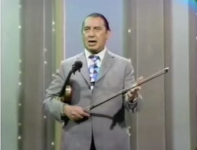Hi Dave – I do a lot of presentations through my job. These are specific to the industry, and I’d like to start speaking at related conferences. I’m not a stand-up comedian but know the importance of humor in getting my message across to an audience. Many of my friends think I am funny in an “I Love Lucy” kind of way… Which I suppose comes naturally. However, I am not sure how to release that side of me when I am giving a humorous presentation. Thanks – DB

Not funny!
Hey DB – When it comes to giving a humorous presentation – or performing as a comedian – the most important goal is to connect with your audience. That’s the bottom line. If you don’t connect, they won’t listen.
And one of the best ways to connect is to be yourself – to let your natural personality shine through.
Let me explain…
Working comics know that stand-up is more than just telling jokes. Anyone can tell a joke, but to be successful, you have to show who you are on stage. Comics, agents, and bookers call it your comedy voice. For speakers, I like to call it who you are on stage.
Look at legends like Rodney Dangerfield and Henny Youngman (and if you don’t know these guys, brush up on your comedy history). Their personalities made their material unforgettable. They could deliver quick, clever one-liners, but what really sold those jokes was them – their character, rhythm, and delivery.

Who? Me?
Fans could retell their jokes the next day at school or around the office water cooler, but the laughs were never quite the same. Why? Because they didn’t have Rodney’s hangdog face or Henny’s sharp timing. Their personalities made the jokes work.
Dangerfield’s humor came from his self-deprecating style – “I get no respect.”
Youngman was the wisecracker – “Take my wife… please!”
Without those distinct personalities, their jokes would have been forgettable.
The same goes for humorous speakers.
I often see speakers try to be “funny” by tossing in a random joke they found online or by reworking an old one to fit their topic. They think this makes them a humorous speaker – but it usually comes across as forced or phony.

Yeah – you!
I’ve seen it too many times: speakers hiding their natural personalities because they think being professional means being serious. That’s fine if your goal is to be strictly informational – but if you want to be memorable, engaging, and genuinely funny, you have to bring your real self to the stage.
So, your friends say you remind them of Lucille Ball. There’s truth in that. I’m sure you’re not trying to imitate Lucy – you just share some of her qualities naturally. That’s part of your charm, and it’s something you can use.
You don’t have to recreate her candy factory scene or hang off the side of a building to channel your inner Lucy. Her comedy wasn’t just slapstick – it was also about timing, expression, and physical energy. Maybe it’s the way you tell a story, use gestures, or react to a situation. Whatever it is, that’s your version of Lucy – and that’s what will connect with an audience.
Here’s the key:
Don’t tell jokes. Tell stories.
If you have stories or examples related to your topic that are naturally funny, lean into them. Use facial expressions, movement, and vocal variety. Keep it natural.
And most importantly – use your personality.
Think about how you talk with your friends. When something funny happens and you tell the story, you probably don’t plan the punchline – you just tell it in your own way, and people laugh. That’s your natural comedic rhythm.
Now imagine your audience as a room full of friends. Deliver your message with that same warmth, spontaneity, and humor. You’ll inform them and entertain them.
People remember speakers who make them feel something – especially laughter. They’ll forget the PowerPoint slides, but they’ll remember you.
That’s how you stand out from the competition.
It worked for Rodney, Henny, and Lucy – and it can work for you, too.
Thanks for reading and as always – keep laughing!!
Click on the banner below to sign up for Dave’s free newsletter.

